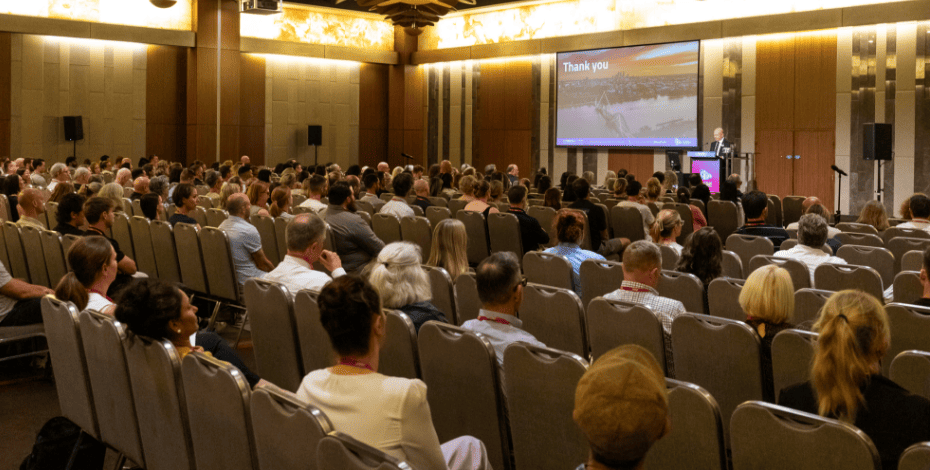
Be the FOCUS

CONFERENCE HIGHLIGHTS The APA’s FOCUS24 conference, held at the end of October at Crown Conference Centre in Perth, focused on the business of physiotherapy.
Scott Willis kicked off FOCUS24, opening his final conference as the APA National President.
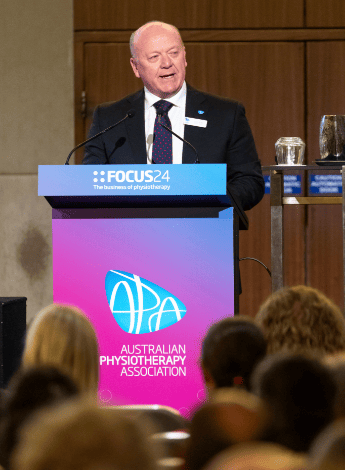
Outgoing APA President Scott Willis welcomes delegates to FOCUS24.
Talking about the value of physiotherapy, Scott told the audience that the COVID-19 pandemic spearheaded the APA’s push for reform, particularly in the areas of scope of practice, direct referrals and the Medicare reforms required to support change.
‘None of this is going to happen if we don’t move past GP practice.
‘We need to do things differently to get better outcomes,’ said Scott.
More than 580 people attended over the three days of the conference, including delegates, speakers and exhibitors.
The wave of change
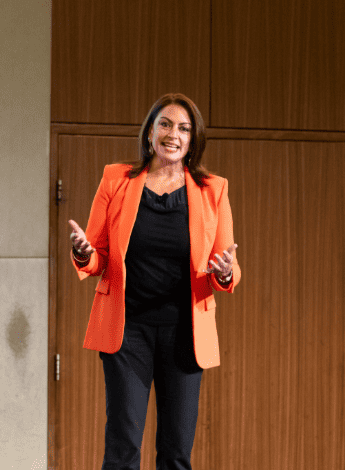
Rabia Siddique had the audience riveted with her story.
Opening keynote speaker Rabia Siddique, a former lawyer and Major in the British Army who successfully sued the UK Ministry of Defence for discrimination after it failed to acknowledge her role in the rescue of two captured Special Forces soldiers in Iraq, had the audience riveted with her account of abuse, trauma and discrimination. Rabia finished with calls to action for leaders and change makers.
‘We need to be willing to confront our realities, both the beautiful and the ugly.
‘We also need to be willing to challenge and change our perceptions so that we can innovate and take risks,’ she said.
‘We must be willing to preserve hope at all costs… and finally, when it really counts, we must be prepared to do the uncomfortable.’
Reforms suggest direct referral pathways are coming
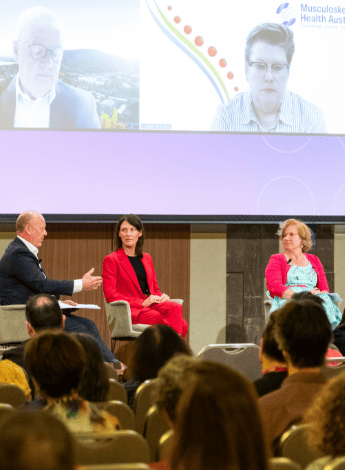
The panel discussion on referral pathways was well attended.
Days before the release of the report from the Australian Government’s Scope of Practice Review, independent review lead Professor Mark Cormack, a leader in health systems and workforce policy at the Australian National University, joined a panel of experts to discuss referral pathways in physiotherapy.
Guided by APA General Manager, Member Experience James Fitzpatrick, the panel considered the pros and cons of giving physiotherapists the ability to refer patients directly to specialists, including orthopaedic surgeons, rather than having to send them back to a GP for further referral.
Mark provided a brief outline of the report and the three major themes identified by the review—workforce design, development, education and planning; legislation and regulation; and funding and payment policy.
One of the key recommendations, Mark said, was for new direct referral pathways for non-GP specialist Medicare Benefits Schedule items.
‘At the moment the main barrier is an ineligibility for a Medicare rebate for direct referral unless the referral comes from a GP,’ he told the audience.
Mark noted that while allowing physiotherapists to refer directly to orthopaedic surgeons was one of the recommendations made by the Scope of Practice Review, it was important that the team approach to care was strengthened and that primary care practitioners such as GPs were notified of referrals to specialists.
He also indicated that imaging referrals were unlikely to be included in the initial round of reforms to referral pathways.
While Scott agreed that GPs need to be part of the care team, he suggested that they may not be the best person to lead treatment—for example, of musculoskeletal conditions.
He advocated strongly for allied health to be part of digital health systems.
He was joined by healthcare consultant and Nous Group principal Ian Thompson, who said that direct referrals to imaging and orthopaedic specialists were of most interest to the physiotherapy profession.
GP and Australian Medical Association representative Dr Mary Wyatt advocated for team-based care and said she didn’t like the idea of cutting the GP out of the referral loop.
She said there needs to be wider access to a patient’s digital health record (for example, the government’s My Health Record) for other clinical professionals.
Team-based care was also raised by other panellists, including allied health organisation Healthia’s Lisa Roach, who noted that co-location of multidisciplinary teams was important to the coordination of multidisciplinary care.
Helen Jentz, CEO of consumer organisation Musculoskeletal Health Australia, advocated for consumers to be included in decisions on who should be in their healthcare team.
‘You need to build consumer confidence in these systems,’ Helen said.
AI gains momentum
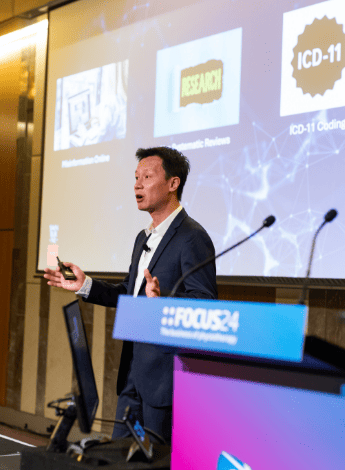
Leo Ng from Swinburne University talked the ways AI can assist physiotherapy.
Artificial intelligence (AI) applications are making rapid advances in the physiotherapy and wider healthcare sectors.
Leo Ng, an associate professor at Swinburne University, delivered a plenary session outlining the ways in which AI can improve physiotherapy practice, leadership, management and education by assisting with clinical documentation and clinical reasoning.
Leo noted that physiotherapists need to think about privacy, consent and data security and pointed potential users towards Ahpra’s guidelines on AI.
‘You should understand a bit about the system before you start using it,’ he said.
Leo also said that more research studies validating the use of AI were needed to support the adoption of the technology.
In another session, physiotherapist Dr Kerrie Evans, the Group Chief Education and Research Officer at Healthia, outlined the results from a research study looking at the impact of AI on clinical practice.
The three-month-long, mixed-methods study involved both clinicians and patients and examined perceptions and experiences, the impact on time spent and patient acceptability.
Along with increased productivity, it showed a statistically significant reduction in time spent on both clinical notes and letters.
Ninety-five per cent of users recommended it.
Since the trial, Healthia has implemented its chosen application across the group and now has more than 400 users.
‘If you’re thinking about implementing it, make sure you allocate time and resources.
‘We’re telling our clinicians to allow at least three weeks of concerted effort to get good at it,’ Kerrie told the audience.
She noted that governance was important and that clinicians needed to realise that the onus was on them to use it correctly.
Darren Ross, a physiotherapist who has rolled out an AI-based clinical documentation system to 34 clinicians in his practice, gave a talk about implementing AI.
He focused on the responsibilities of the practice and the clinician.
‘You need to work out why you’re using AI. Are you using it to unblock your practitioner, to help them write notes and letters, or are you using it as a business owner because you want them to see more patients?’ Darren said.
He quoted the Royal Australian and New Zealand College of Radiologists, who said that the decision to use AI should be in the hands of the physician or practitioner rather than the hospital or practice.
The use of AI in physiotherapy education was also raised in several sessions.
University of New South Wales lecturer Jacqueline North outlined how the physiotherapy program incorporates AI simulations of patient interactions as well as virtual reality and e-learning approaches to provide students with authentic learning experiences.
Leo talked about apps that assist with doing literature searches and finding relevant research to support arguments or that assist educators in analysing the quality of learning.
Pitchfest winners recall successes and failures
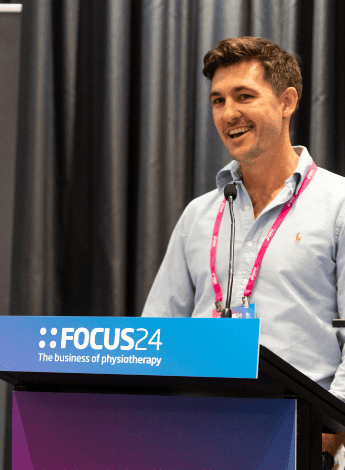
2022 Pitchfest winner Daniel Hug gave a presentation on the lessons he learned as an innovator.
The PRF’s Physio Pitchfest is a popular event at APA scientific conferences.
At FOCUS24, past recipients of Judges’ and People’s Choice Awards showcased their innovations and discussed their successes and failures in physiotherapy innovation.
The presentation by 2022 winner Daniel Hug focused on the things he learned while developing SummaRise, an app designed to assist clinicians in aged care facilities to assess and manage falls.
While Daniel has recently opted to discontinue development and marketing of the SummaRise app, he said it was a valuable learning experience and he has been able to apply the business knowledge he gained to his current business—a home-based physiotherapy service.
‘While we didn’t get the sales conversion, we did get a lot of things right,’ Daniel told the audience.
He said poor timing in the marketplace immediately post-COVID was one factor, while others included not validating the idea well enough before commencing development of the app and focusing on development rather than sales.
On the plus side were things like finding a tech-aligned co-founder, being strategic about entering innovation programs and competitions to achieve the best outcomes and running a lean operation.
Joanna Morris, the 2023 Rising Star Award winner, took the audience through the development of Matilda Health, a digital health startup focused on providing affordable and accessible holistic care for individuals with endometriosis.
‘The key elements for success in digital health are that you need to be resilient, you need to love the problem and you should surround yourself with innovation people or reach out to accelerator programs,’ Joanna said.
Indigenous learning and teaching
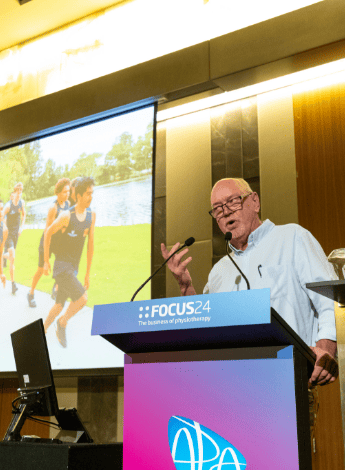
Former footballer and CEO of the Clontarf Foundation Gerard Neesham talked about the organisation's program for Aboriginal and Torres Strait Islander boys.
Keynote speaker and Clontarf Foundation CEO Gerard Neesham took the audience through the history and development of the organisation, which helps young Aboriginal and Torres Strait Islander men finish school and enter employment through Clontarf ‘academies’ embedded in schools and educational programs.
The program started in 2000 and has more than 11,000 participants in 158 academies across Australia.
Gerard emphasised that its success lay in its non-judgemental and non-authoritative approach to support and mentoring.
‘The kids have to want to do it,’ he said.
The importance of providing Cultural Safety training to physiotherapists, including students and the educators teaching them, was also highlighted in a series of sessions presented by Aboriginal physiotherapists Marilyn Morgan, Blayne Arnold and Michael Reynolds.
Marilyn, an Honoured Member of the APA, outlined the measures that Ahpra is taking to Close the Gap in healthcare for Aboriginal and Torres Strait Islander peoples and to ensure that physiotherapists and all registered health professionals can provide culturally safe care, free of racism, including the ongoing development of its National Cultural Safety Accreditation and Continuing Professional Development Upskilling Framework and Strategy.
‘Significant research has provided the evidence that racism is the main social determinant of ill health in Aboriginal and Torres Strait Islander people,’ Marilyn said.
Blayne, a lecturer at Griffith University, presented the results of a mixed-methods study he recently completed examining the preparedness of physiotherapy students to work with Aboriginal and Torres Strait Islander patients.
His study showed that while second-year students in Griffith’s four-year course feel the least prepared, students in the third and fourth years were more aware of the gaps in their knowledge and experience.
‘It’s the job of universities to embed cultural awareness training into curriculum,’ Blayne said.
He plans to look at staff knowledge and preparedness next.
Michael, chair elect of the Australian Physiotherapy Council, deputy head of Australian Catholic University’s School of Allied Health NSW and Aboriginal and Torres Strait Islander Curriculum and Pedagogy Co-ordinator in Physiotherapy, explored ways of embedding Aboriginal and Torres Strait Islander culture into physiotherapy education.
‘Everyone benefits from cultural capability training.
‘We need to stop box ticking and start setting students up for lifelong learning,’ Michael said.
A new perspective
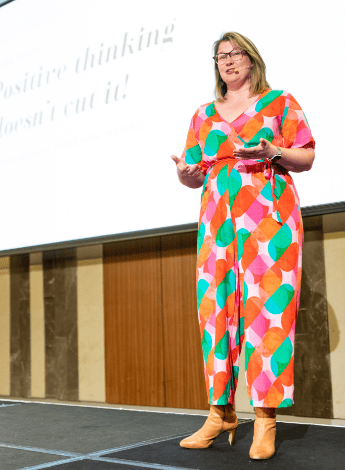
Clare Desira closed out the conference with a talk about changing your mindset.
Keynote speaker Clare Desira closed out the conference with a talk about mindset and resilience.
‘Positive and negative thinking doesn’t cut it,’ Clare said.
‘We should ask ourselves “What is helpful for us to focus on right now?”’
Finally, Mark Round, chair of the APA Board of Directors, announced the dates for next year’s APA Scientific Conference APASC25, to be held in Adelaide from 23 to 25 October 2025 at Adelaide Convention Centre.
© Copyright 2025 by Australian Physiotherapy Association. All rights reserved.





